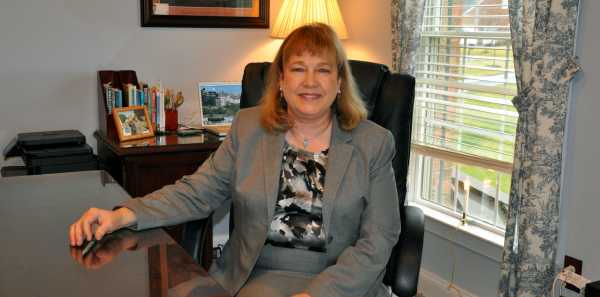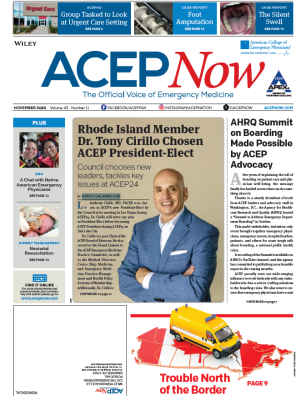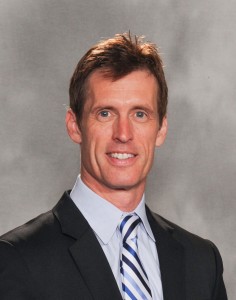
They say there’s no such thing as bad publicity, but public relations directors know that promoting an organization’s message to the world while mitigating mistakes and managing bad news is hard work. Laura Gore, who has been ACEP’s public relations director since 1997, knows how critical a strong PR team is to an organization’s success and how vital it can be to accomplishing ambitious goals. After more than 20 years with ACEP, Ms. Gore is leaving in late December.
Explore This Issue
ACEP Now: Vol 37 – No 12 – December 2018Ms. Gore recently sat down with ACEP Now Medical Editor-in-Chief Kevin Klauer, DO, EJD, FACEP, to discuss her experience promoting ACEP and its agenda to the public and some of the highlights of her time with the organization.
KK: You are one of ACEP’s unsung heroes behind the scenes who rarely gets the recognition she deserves. This interview is also bittersweet because you’re retiring, leaving the organization. I don’t know that we will ever fully fill your role because of the great service you‘ve provided. Tell us a little bit about what serving ACEP and our membership has meant to you.
LG: When I started with ACEP, there were 17,000 members. We used fax machines to send press releases. I didn’t even have a personal cellphone yet. Larry Bedard was president; I missed Greg Henry by one year. It’s just meant everything for me to be part of ACEP. I love what emergency physicians do, and it’s been my privilege and honor to serve this organization for more than 20 years.
KK: Well, that‘s very, very humble of you. Your service has been outstanding.
You just said something that wasn’t lost on me—you missed Greg Henry as president by a year. Was that a positive or a negative? Greg did tend, during his presidency, to push the envelope a bit with making sure emergency medicine was represented. Would you have been up for such a challenge?

Ms. Gore with “ER” cast member Maura Tierney in the U.S. Capitol during Rally at the Capitol.
LG: All kidding aside, he is a strong communicator. There is no one who could put a sound bite together better than Greg Henry. But I do remember being at a Scientific Assembly meeting where an NBC News reporter wanted to cover one of Greg’s presentations. I do remember Greg started out by saying something like, “We all have to come to grips with we have to kill Grandma.” And I leaned over to the NBC reporter and basically said, “Well, he doesn’t necessarily represent ACEP’s views on everything.” I love Greg Henry. He has always been there whenever we’ve solicited information from our spokespeople.
KK: Your job probably was very complicated when you started. I suspect it might be even more complicated now. How has public relations changed in the new age of social media and the advancement of communication tools?
LG: There has, as you know, been a sea change in how you relate to the press, and social media has made it possible for organizations to become the source of news. If we can be nimble and fast enough to get out there with the story, we can be the source of news. Mike, one of my colleagues in my office, has been a TV reporter. He’s used to packaging video stories, and now ACEP has that added capability. Twenty years ago, reporters had longer deadlines. You might have until the end of the day. Today, everybody’s on deadline within a couple of hours, and if you can’t respond within a couple of hours, you won’t be included in the story.
I’m proud that ACEP has evolved into a nimble organization. Our spokespeople understand that; they are responsive. I think ACEP is probably one of the more nimble organizations out there, especially in medical specialty organizations.
KK: What were some of the PR successes the College has had?
LG: Going back many years, one of the most remarkable experiences I’ve ever had was after September 11, when the organization decided to move ahead and still hold the scientific assembly in Chicago. In PR, sometimes you really have to be positioned properly for breaking news situations, and of course, the whole country was focused on anthrax and on September 11. Fortuitously, Annals of Emergency Medicine published a study about anthrax, which we ended up parlaying into letting all the press know that we had disaster preparedness and anthrax experts at the meeting. Kevin, the press descended upon our convention.
Michael Carius was president, and Kristi Koenig was there. Bless her heart; she did interview after interview. We had 10 cameras lined up outside our press office. We were on “Good Day Chicago,” and ABC’s “20/20” came to interview Mike Carius. It was one of the most remarkable experiences I’ve ever had as a PR person.
Although not as dramatic as September 11, covering ebola was incredible in the sense that the press showed up and we were doing live interviews from Fox Business News right on the convention floor. Sometimes it’s just a matter of taking advantage of breaking news situations.
KK: Being able to position the organization well with the cards you’ve been dealt, along with appropriate timing, is a skill set that you and your team have. You’ve created some mic-drop moments for the College, and we definitely appreciate that. Now a more difficult question: Nobody’s perfect, and ACEP can’t be perfect every time. Do you recall a circumstance when there was a challenging topic for ACEP and it didn’t go as well as you would’ve liked?
LG: Well, it was a very tense moment for me when we did the first Report Card on Emergency Medicine. Dean Wilkerson was new, and we were under pressure to really make this resonate across America. We did 50 state press releases with talking points, working with all of the state chapters. While we were writing, we discovered a data error, but we had already gone out to reporters and presented them the data because you have to work way in advance of a big release. Now we realized we may need to recheck the whole thing.
We all agreed to step back, and without losing any credibility, we needed to tell these reporters. I ended up just being honest with them, saying that we found a data error. We were checking everything, and it all worked out fine. I will give you one that didn’t work, too. The report card was very successful, but that was one of the more tense moments of my life.
We did have a situation that I recall in New York, I believe. We were at a convention center. We did a tele-news conference, but there was no sound! We had a silent news conference broadcasting to the world. I’m standing there, and our spokespeople were there. The press was in the room. We ended up giving everybody who was online the archived tele-news conference. It’s hard to put a positive spin on a silent news conference.
KK: In your years with ACEP, with the specialty and through your critical contributions, is there one thing you think was paramount to your experience with ACEP?
LG: Well, that’s hard. There are so many different moments, but I do remember the Rally at the Capitol in 2005.
Arthur Kellermann called it “the Woodstock of emergency medicine,” which I loved. It was a crazy time; it was very difficult. After the rally, we were going into the Capitol, accepting an award on behalf of the TV show “ER.” I was up on the stage, and the photographer said to me, “Can you have everybody move to the left?” I remember going to the microphone and choreographing a move of emergency physicians I was devoted to serving. It was a thrilling moment to see all those faces, all those white coats, gathered for this important event. The Rally at the Capitol was an exciting moment for me.
KK: You and your staff do such a good job at representing all of us, and rarely do you get enough recognition. Thank you very much, Laura, for all of your support and dedication.
LG: It really is a partnership with emergency physicians, and over the years we’ve built a network of spokespeople, 600 media-trained emergency physicians in media markets across the United States. That has been a strength for ACEP. It really is valuable, and the reporters want to hear from our doctors.
KK: Well, that’s another great accomplishment for you and your team that will be continued for generations of emergency physicians, and that’s part of your legacy. Thank you again for all of your hard work and all of your support for ACEP and for the specialty of emergency medicine.
LG: Thank you so much. I appreciate it, Kevin
Pages: 1 2 3 4 | Multi-Page





No Responses to “How ACEP’s PR Director Helped Shape Our Story for Two Decades”